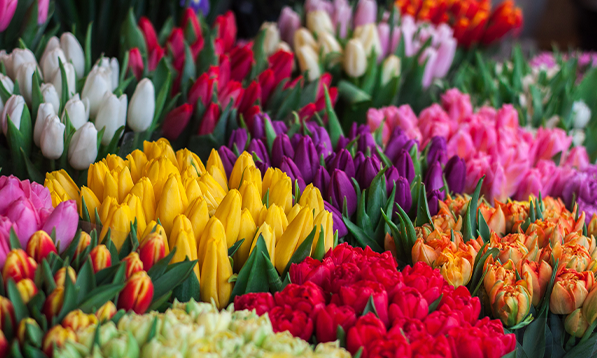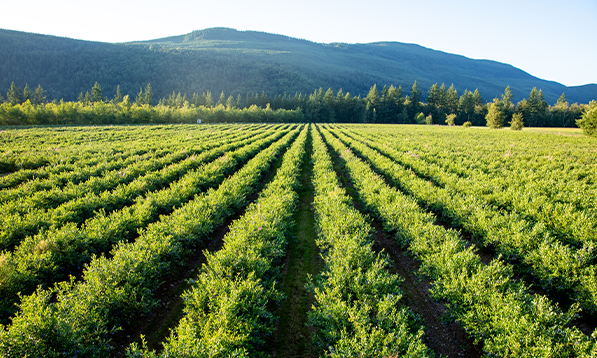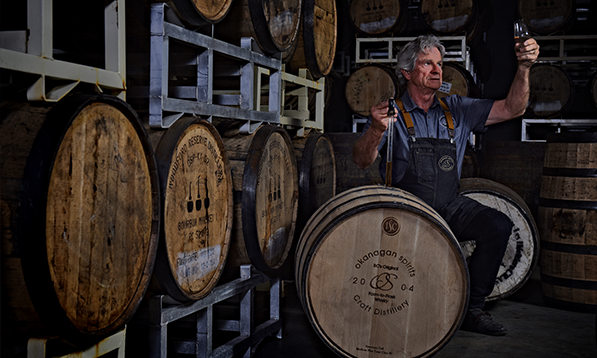
Farm to Flask: We chat about terroir-driven spirits with Tyler Dyck
June 10, 2020
Can one taste tell you a story about the land, climate and soil your food came from? That’s the key concept behind terroir. Okanagan Spirits (a family owned and operated distillery in Kelowna and Vernon) started with this idea: using 100% locally sourced BC grains, berries and fruits to make spirits influenced by the Okanagan’s unique terroir. Recently, we talked to CEO Tyler Dyck about Okanagan Spirits, and how their deep roots in the community and relationships with Okanagan farmers have helped them develop their distinctive flavour.
WHL: Can you tell us a bit about how your family is involved in your business?
Tyler Dyck: The full family is involved! There’s my dad Tony (President of Okanagan Spirits Craft Distilleries) and myself (CEO, and President of the Craft Distillers Guild of BC). My twin sister Melissa does our events, marketing and packaging. My older brother Jeremie and my sister work together on the social media and digital marketing side of things as well - my brother does all the photography. My mom Pat loves her gardens down here and if you come out to the distilleries there are always beautiful flowers. And then there’s our extended family as well -- of all our distillers and our tasting room hosts.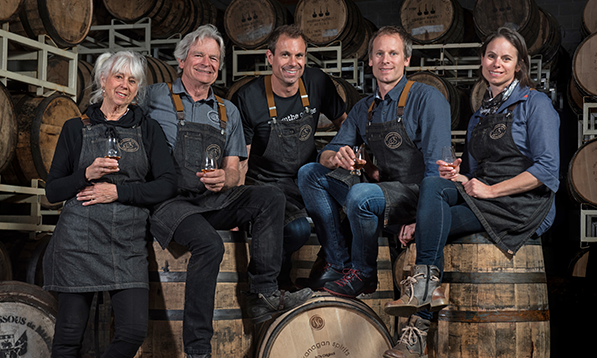
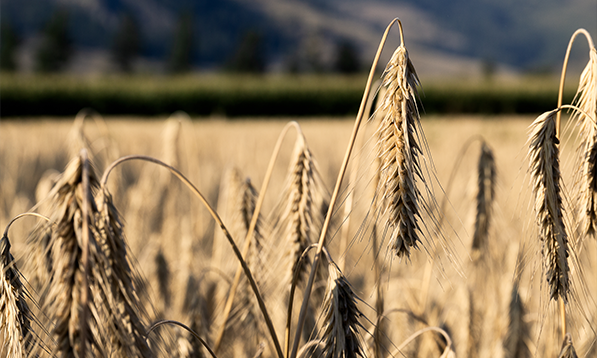
WHL: We know that terroir is very important to wine. Is there a terroir to your products as well?
TD: Terroir has always been fundamental to the ethos of our distillery. We’ve been in the Okanagan for four generations and we feel that if we’re going to make a spirit, we should make something that is our story to tell. So it has to be born in the Okanagan Valley just like us. We were born here, we grew up here, we got weathered by the cold dry winters and the hot dry summers. The environment around you plays into the flavours -- the aromas -- of the grains and the fruit in our areas. You can’t replicate that with artificial ingredients.WHL: Can you describe your philosophy of Farm to Flask?
TD: The word “craft” has been so heavily misused that even global beverage companies have “craft beer.” That’s why we changed our personal explanation of what we do to Farm To Flask. We are orchard to flask, farm to flask because of our relationship to the land. What makes true craft distilling exciting is that it allows the general public to taste an expression of the land where that fruit or grain was grown, and so they’re not drinking the same thing - it’s not a standardized product. Our rye whisky, or our apple-based vodka, will taste very different than even the apples that come from the South Okanagan. I would go so far as to say: if something does taste similar, then you know you have a problem. What’s essential to the core of true farm to flask, is it’s allowing the flavours to speak the stories of that land, and time, as well of the region that you’re from.What makes true craft distilling exciting is that it allows the general public to taste an expression of the land where that fruit or grain was grown, and so they’re not drinking the same thing - it’s not a standardized product.
WHL: Do you have relationships with the farmers you source from?
TD: We work with local farmers and every piece of fermentable material that we use is grown locally here. All of the crushing and fermenting we do ourselves, but the growing happens through good relationships with grain farmers, berry farmers, wild foragers -- when I say extended family, it really is about this ever-growing exciting family of people. We started with fruit, working with the local orchardists and berry farmers. Then we got into local grain.In BC, if you’re distilling yourself through a craft distilling license, it has to come from 100% BC agricultural products. But if you’re just starting out, it’s very hard to go to a grower and say “I want you to grow just a couple of bushels of grain for me.” So most of the distilleries buy 100% BC grown grain from areas like the Peace Region. Instead, we went to local growers who had inherited the family farm but who weren’t planting because they couldn’t grow enough quantity to sell to the mass market. We asked them to use their land and experience to have a conversation about different heritage varieties of grain unique to this area. We said that if they would grow according to some guidelines and parameters, we’d pay top dollar for it - because it would have something that no one can emulate. It grew from one farmer saying well, “I’ve got 20 acres, why don’t I grow five acres for you” -- to this year, locally, we’ll have a couple hundred acres of grains in the Valley
WHL: You produce The Family Reserve Vodka which is BC’s first apple-based Vodka. What kind of apples do you use for that?
TD: Our Family Reserve Vodka, if you look right at the core of it (no pun intended) is based around elements of McIntosh and Spartan apples that are historical symbols of the Okanagan Valley. Every apple will give a different taste signature, just like every grape -- if you look at a Pinot Noir versus a Cabernet, they’ll have very different characteristics and it's the same thing with apples as well. We’re lucky to have our family history and our distilleries here in the Okanagan, because it’s a ridiculously amazing growing area. It’s got long hot summers and if you have irrigation you can pretty much grow anything here.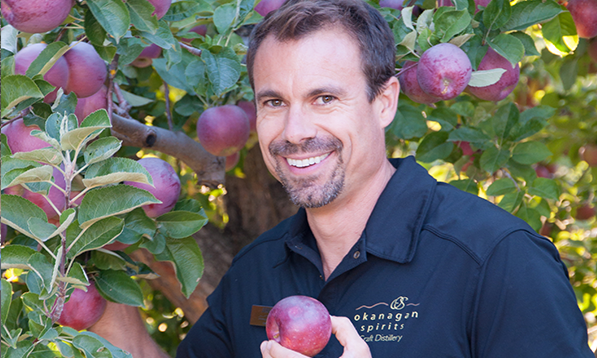
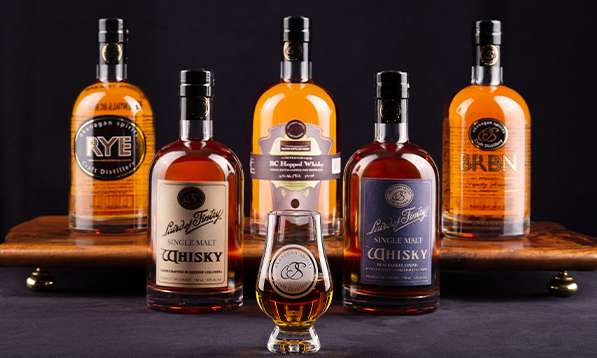
WHL: How does valuing terroir and your community mindset affect how you run the distillery?
TD: If terroir is important to you like it is to our family, then it’s important to know that all of the crushed fruit, the crushed grains go back to the land to have a second life. It’s about that whole cycle of not wasting anything. One farmer comes daily to pick up the wet mash for livestock feed. So again you have that link to the terroir, you’re not just putting everything into the landfill.That ethic extends to what are called the “tails” and “fronts” from distilling - they’re kind of the not-nice parts of the distillate. Those are what we use to power all Okanagan Spirits vehicles. They - especially the tails - often get thrown into your next whisky. That’s where you often get some of the really fiery kicks from whisky. But we like a really smooth profile instead, so we take all of our tails, we redistill them and then we mix them with our fronts so that we can use them to cut down on our environmental impact. My dad drives on our apple-based vodka fronts, and I drive on whisky fronts. Our company vehicles drive on these fronts which allow us to cut down on our carbon footprint when we are delivering our product to market.
Feeling thirsty? Okanagan Spirits are perfect when sipped on their own, but they’re also delightful in a wide variety of cocktails. Kick off the start of summer and celebrate ‘Farm to Flask’ with these delicious options featuring fresh BC fruit: Okanagan Martini, Strawberry Smash, and the Sweet or Savoury Apple Cider Vodka. And while you enjoy them, consider supporting their Flatten The Curve initiative, which has helped Okanagan Spirits manufacture and donate over 45,000 bottles of hand sanitizer to front-line workers in the Okanagan during the COVID-19 pandemic.
Follow us on Facebook and Instagram to learn more, and to meet more BC food producers.
